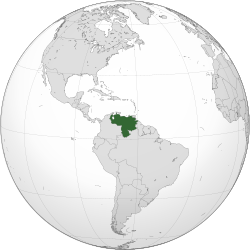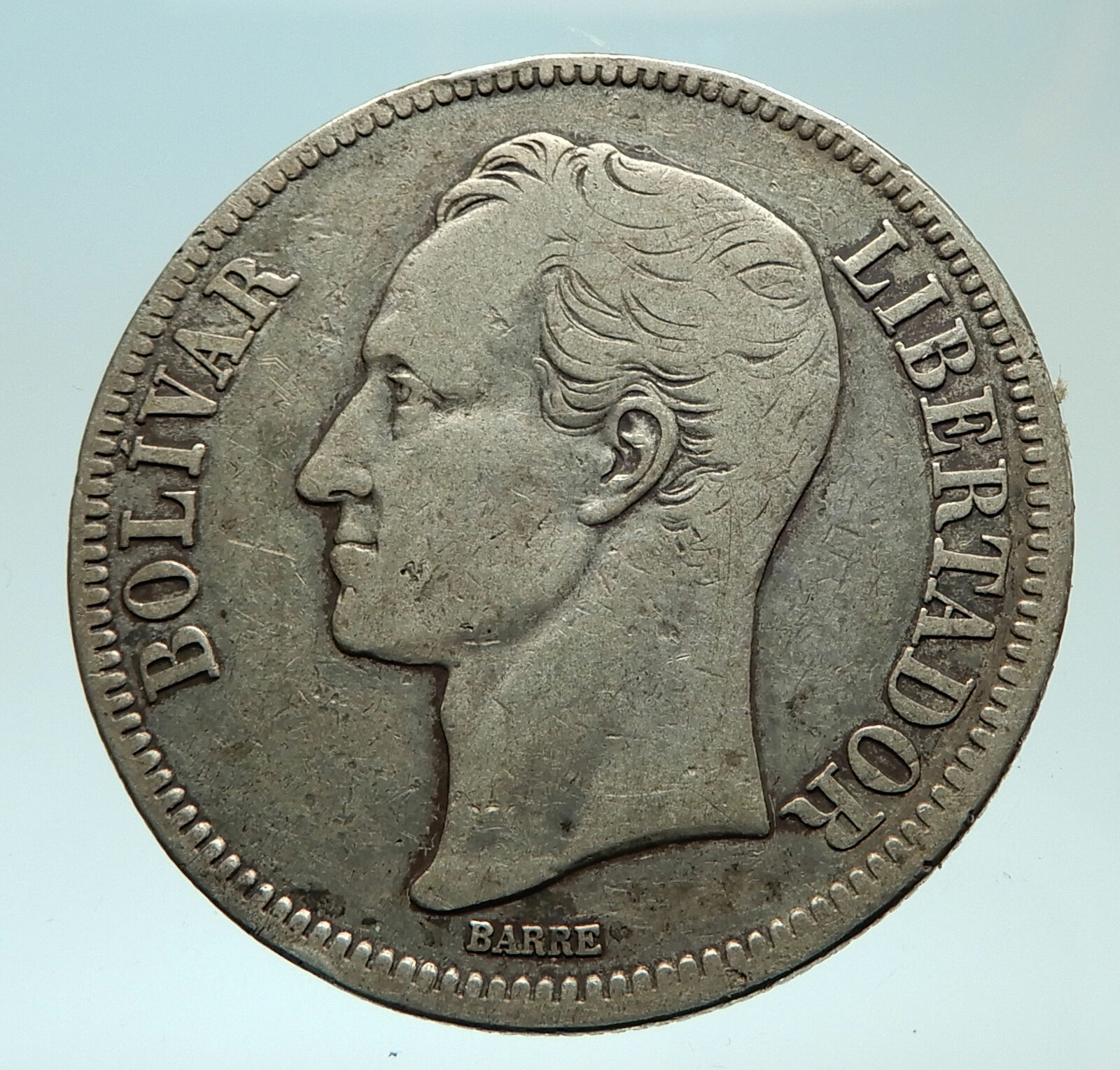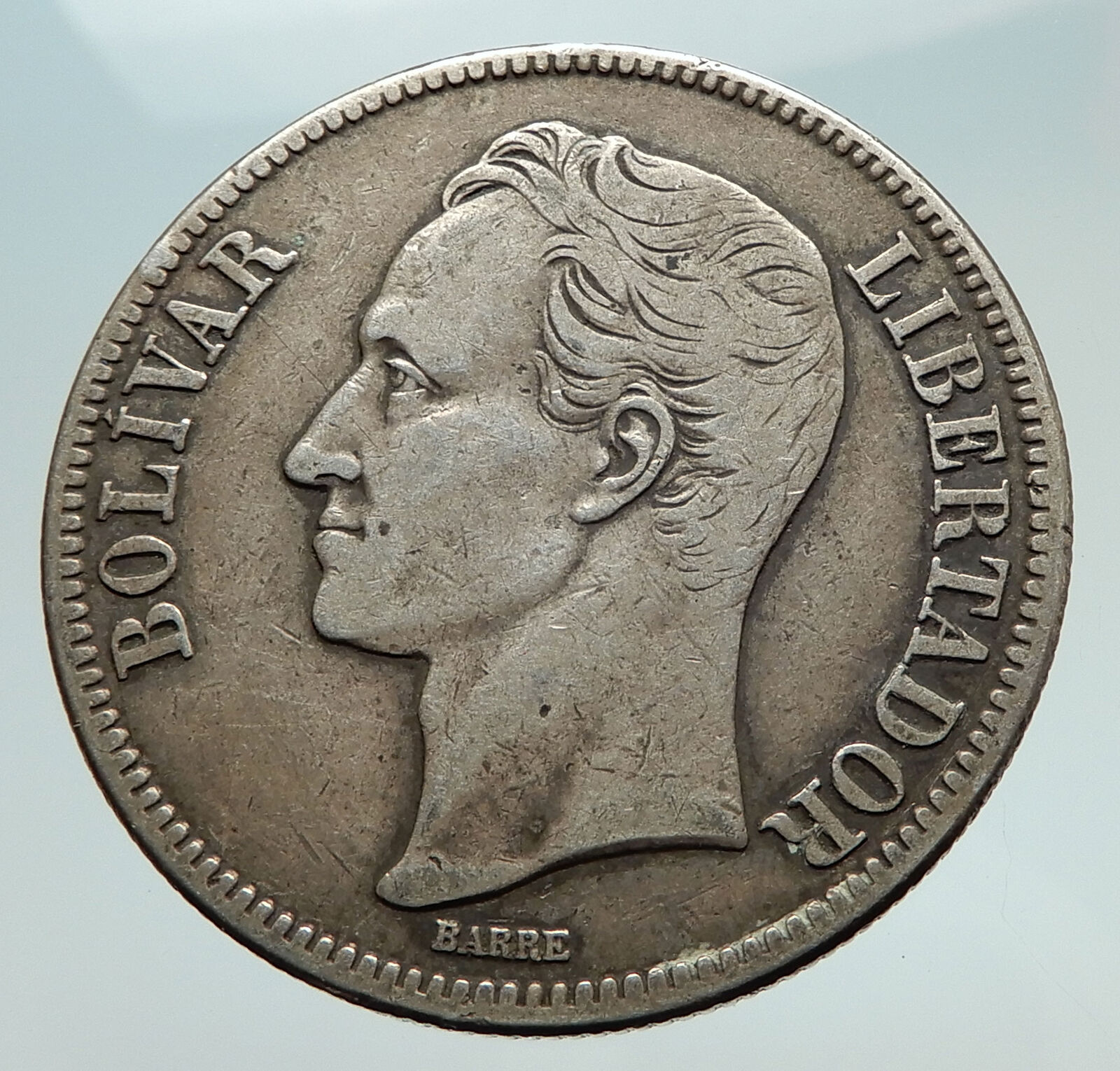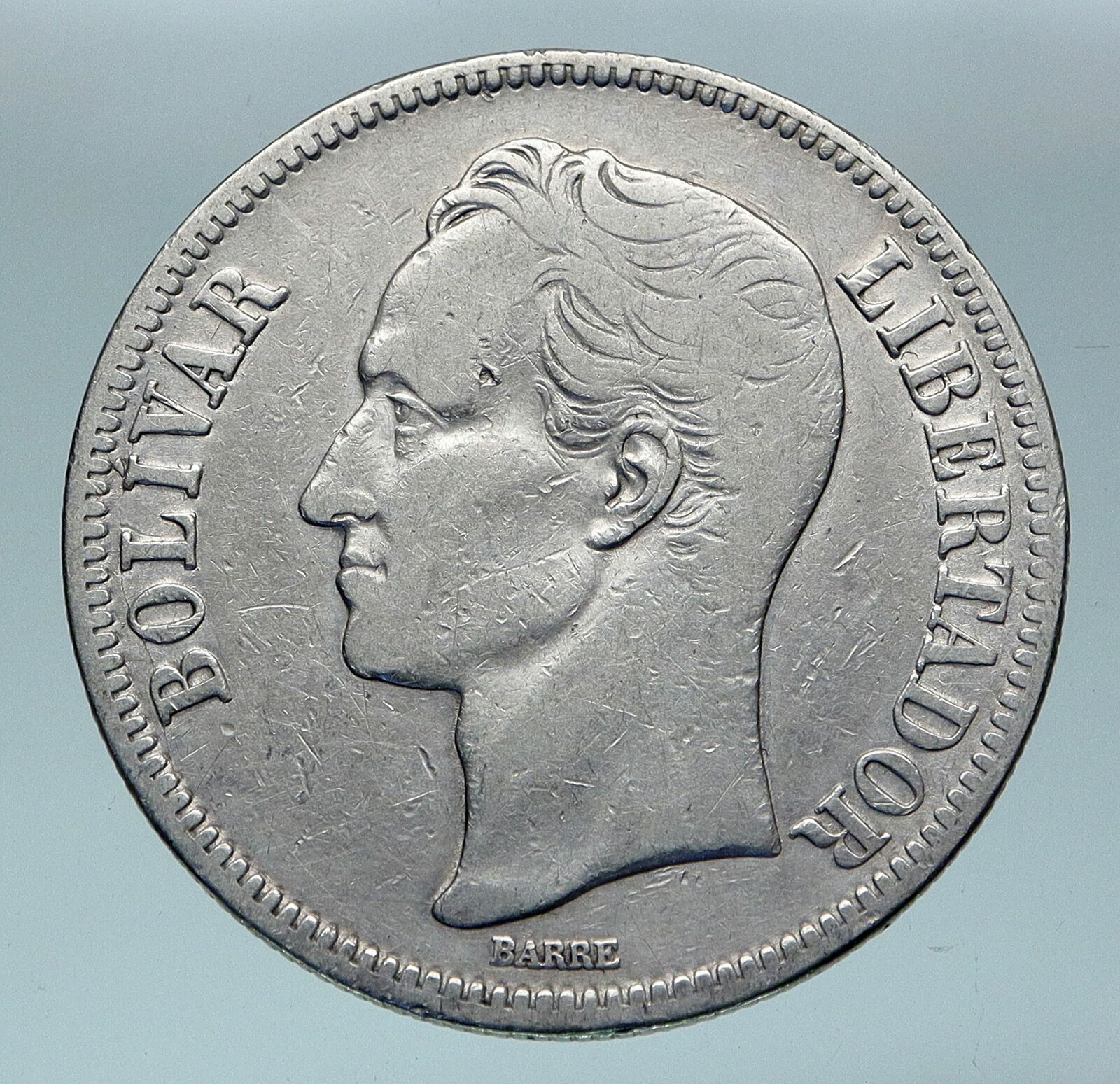|
Venezuela – Simon Bolivar
1965 Silver Bolivar (Gram 5) 22mm (5.01 grams) 0.835 Silver (0.1342 oz. ASW) Reference: Y# 37a (1960,1965)
BOLIVAR LIBERTADOR BARRE, head of Simon Bolivar left.
★REPÚBLICA DE VENEZUELA★ UN BOLÍVAR ★ ★ GR.5 LEI.835, ◦ around the coat-of-arms of Venezuela, year below.
You are bidding on the exact item pictured, provided with a Certificate of Authenticity and Lifetime Guarantee of Authenticity.
 Simón José Antonio de la Santísima Trinidad Bolívar y Palacios Ponte y Blanco (24 July 1783 – 17 December 1830), commonly known as Simón Bolívar or Simon Bolivar, was a Venezuelan military and political leader. Bolívar played a key role in Latin America’s successful struggle for independence from the Spanish Empire, and is today considered one of the most influential politicians in the history of the Americas. Simón José Antonio de la Santísima Trinidad Bolívar y Palacios Ponte y Blanco (24 July 1783 – 17 December 1830), commonly known as Simón Bolívar or Simon Bolivar, was a Venezuelan military and political leader. Bolívar played a key role in Latin America’s successful struggle for independence from the Spanish Empire, and is today considered one of the most influential politicians in the history of the Americas.
Following the triumph over the Spanish monarchy, Bolívar participated in the foundation of the first union of independent nations in Hispanic-America, a republic, now known as Gran Colombia, of which he was president from 1819 to 1830. Bolívar is regarded as a hero, visionary, revolutionary, and liberator in Hispanic-America.
During his lifetime, he led Venezuela, Colombia (including Panama at the time), Ecuador, Peru (together with Don José de San Martín), and Bolivia to independence from the Spanish Empire. Admirers claim that he helped lay the foundations for democracy in much of Latin America.
 Venezuela, officially called the Bolivarian Republic of Venezuela (Spanish: República Bolivariana de Venezuela, is a country on the northern coast of South America. Venezuela’s territory covers around 916,445 km2 (353,841 sq mi) with an estimated population around 29,100,000. Venezuela is considered a state with extremely high biodiversity, with habitats ranging from the Andes Mountains in the west to the Amazon Basin rainforest in the south, via extensive llanos plains and Caribbean coast in the center and the Orinoco River Delta in the east. Venezuela, officially called the Bolivarian Republic of Venezuela (Spanish: República Bolivariana de Venezuela, is a country on the northern coast of South America. Venezuela’s territory covers around 916,445 km2 (353,841 sq mi) with an estimated population around 29,100,000. Venezuela is considered a state with extremely high biodiversity, with habitats ranging from the Andes Mountains in the west to the Amazon Basin rainforest in the south, via extensive llanos plains and Caribbean coast in the center and the Orinoco River Delta in the east.
  Venezuela was colonized by Spain in 1522 amid resistance from indigenous peoples. In 1811, it became one of the first Spanish-American colonies to declare independence, which was not securely established until 1821, when Venezuela was a department of the federal republic of Gran Colombia. It gained full independence as a separate country in 1830. During the 19th century, Venezuela suffered political turmoil and autocracy, remaining dominated by regional caudillos (military strongmen) until the mid-20th century. Since 1958, the country has had a series of democratic governments. Economic shocks in the 1980s and 1990s led to several political crises, including the deadly Caracazo riots of 1989, two attempted coups in 1992, and the impeachment of President Carlos Andrés Pérez for embezzlement of public funds in 1993. A collapse in confidence in the existing parties saw the 1998 election of former coup-involved career officer Hugo Chávez and the launch of the Bolivarian Revolution, beginning with a 1999 Constituent Assembly to write a new Constitution of Venezuela. Venezuela was colonized by Spain in 1522 amid resistance from indigenous peoples. In 1811, it became one of the first Spanish-American colonies to declare independence, which was not securely established until 1821, when Venezuela was a department of the federal republic of Gran Colombia. It gained full independence as a separate country in 1830. During the 19th century, Venezuela suffered political turmoil and autocracy, remaining dominated by regional caudillos (military strongmen) until the mid-20th century. Since 1958, the country has had a series of democratic governments. Economic shocks in the 1980s and 1990s led to several political crises, including the deadly Caracazo riots of 1989, two attempted coups in 1992, and the impeachment of President Carlos Andrés Pérez for embezzlement of public funds in 1993. A collapse in confidence in the existing parties saw the 1998 election of former coup-involved career officer Hugo Chávez and the launch of the Bolivarian Revolution, beginning with a 1999 Constituent Assembly to write a new Constitution of Venezuela.
Venezuela is a federal presidential republic consisting of 23 states, the Capital District (covering Caracas), and federal dependencies (covering Venezuela’s offshore islands). Venezuela also claims all Guyanese territory west of the Essequibo River, a 159,500-square-kilometre (61,583 sq mi) tract dubbed Guayana Esequiba or the Zona en Reclamación (the “zone being reclaimed”).
Venezuela is among the most urbanized countries in Latin America; the vast majority of Venezuelans live in the cities of the north, especially in the capital, Caracas, which is also the largest city in Venezuela. Since the discovery of oil in the early 20th century, Venezuela has the world’s largest oil reserves and been one of the world’s leading exporters of oil. Previously an underdeveloped exporter of agricultural commodities such as coffee and cocoa, oil quickly came to dominate exports and government revenues. The 1980s oil glut led to an external debt crisis and a long-running economic crisis, in which inflation peaked at 100% in 1996 and poverty rates rose to 66% in 1995 as (by 1998) per capita GDP fell to the same level as 1963, down a third from its 1978 peak.
The recovery of oil prices after 2001 boosted the Venezuelan economy and facilitated social spending which significantly reduced economic inequality and poverty, although the fallout of the 2008 global financial crisis caused a renewed economic downturn. In February 2013, Venezuela devalued its currency due to the rising shortages in the country. Shortages of items included toilet paper, milk, flour, and other necessities. As of June 2014, Venezuela’s inflation has increased to 62%. This was one of the main causes of the 2014 Venezuelan protests.
|




 Simón José Antonio de la Santísima Trinidad Bolívar y Palacios Ponte y Blanco (24 July 1783 – 17 December 1830), commonly known as Simón Bolívar or Simon Bolivar, was a Venezuelan military and political leader. Bolívar played a key role in Latin America’s successful struggle for independence from the Spanish Empire, and is today considered one of the most influential politicians in the history of the Americas.
Simón José Antonio de la Santísima Trinidad Bolívar y Palacios Ponte y Blanco (24 July 1783 – 17 December 1830), commonly known as Simón Bolívar or Simon Bolivar, was a Venezuelan military and political leader. Bolívar played a key role in Latin America’s successful struggle for independence from the Spanish Empire, and is today considered one of the most influential politicians in the history of the Americas. Venezuela, officially called the Bolivarian Republic of Venezuela (Spanish: República Bolivariana de Venezuela, is a country on the northern coast of South America. Venezuela’s territory covers around 916,445 km2 (353,841 sq mi) with an estimated population around 29,100,000. Venezuela is considered a state with extremely high biodiversity, with habitats ranging from the Andes Mountains in the west to the Amazon Basin rainforest in the south, via extensive llanos plains and Caribbean coast in the center and the Orinoco River Delta in the east.
Venezuela, officially called the Bolivarian Republic of Venezuela (Spanish: República Bolivariana de Venezuela, is a country on the northern coast of South America. Venezuela’s territory covers around 916,445 km2 (353,841 sq mi) with an estimated population around 29,100,000. Venezuela is considered a state with extremely high biodiversity, with habitats ranging from the Andes Mountains in the west to the Amazon Basin rainforest in the south, via extensive llanos plains and Caribbean coast in the center and the Orinoco River Delta in the east.
 Venezuela was colonized by Spain in 1522 amid resistance from indigenous peoples. In 1811, it became one of the first Spanish-American colonies to declare independence, which was not securely established until 1821, when Venezuela was a department of the federal republic of Gran Colombia. It gained full independence as a separate country in 1830. During the 19th century, Venezuela suffered political turmoil and autocracy, remaining dominated by regional caudillos (military strongmen) until the mid-20th century. Since 1958, the country has had a series of democratic governments. Economic shocks in the 1980s and 1990s led to several political crises, including the deadly Caracazo riots of 1989, two attempted coups in 1992, and the impeachment of President Carlos Andrés Pérez for embezzlement of public funds in 1993. A collapse in confidence in the existing parties saw the 1998 election of former coup-involved career officer Hugo Chávez and the launch of the Bolivarian Revolution, beginning with a 1999 Constituent Assembly to write a new Constitution of Venezuela.
Venezuela was colonized by Spain in 1522 amid resistance from indigenous peoples. In 1811, it became one of the first Spanish-American colonies to declare independence, which was not securely established until 1821, when Venezuela was a department of the federal republic of Gran Colombia. It gained full independence as a separate country in 1830. During the 19th century, Venezuela suffered political turmoil and autocracy, remaining dominated by regional caudillos (military strongmen) until the mid-20th century. Since 1958, the country has had a series of democratic governments. Economic shocks in the 1980s and 1990s led to several political crises, including the deadly Caracazo riots of 1989, two attempted coups in 1992, and the impeachment of President Carlos Andrés Pérez for embezzlement of public funds in 1993. A collapse in confidence in the existing parties saw the 1998 election of former coup-involved career officer Hugo Chávez and the launch of the Bolivarian Revolution, beginning with a 1999 Constituent Assembly to write a new Constitution of Venezuela.




